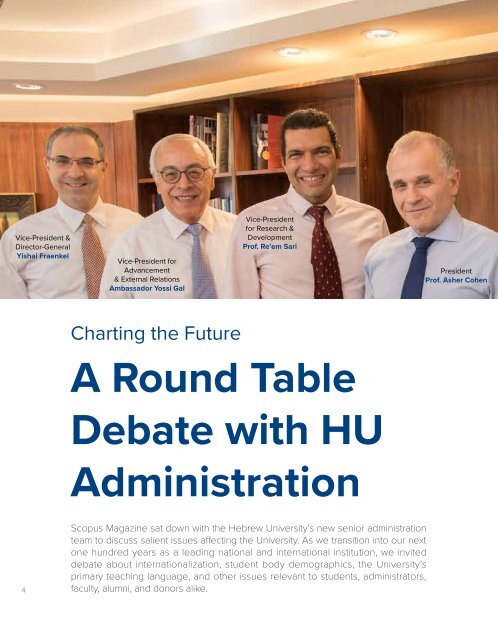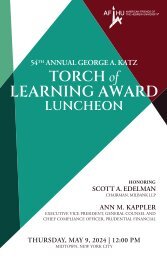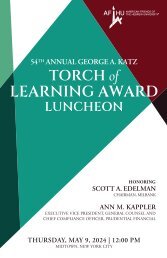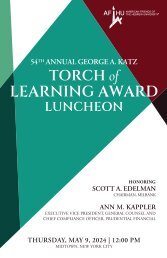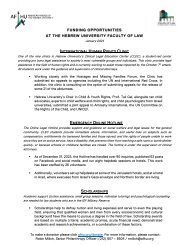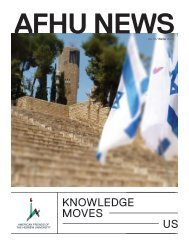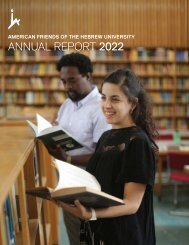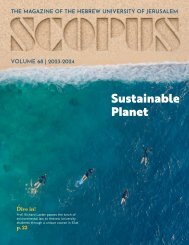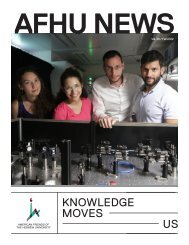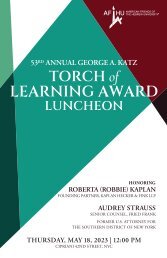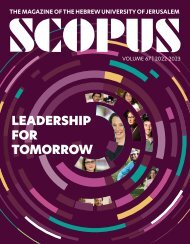Create successful ePaper yourself
Turn your PDF publications into a flip-book with our unique Google optimized e-Paper software.
Vice-President &<br />
Director-General<br />
Yishai Fraenkel<br />
Vice-President for<br />
Advancement<br />
& External Relations<br />
Ambassador Yossi Gal<br />
Vice-President<br />
for Research &<br />
Development<br />
Prof. Re’em Sari<br />
President<br />
Prof. Asher Cohen<br />
Rector<br />
Prof. Barak Medina<br />
Vice-President for<br />
International Affairs<br />
Prof. Oron Shagrir<br />
Charting the Future<br />
A Round Table<br />
Debate with HU<br />
Administration<br />
<strong>Scopus</strong> Magazine sat down with the Hebrew University’s new senior administration<br />
team to discuss salient issues affecting the University. As we transition into our next<br />
one hundred years as a leading national and international institution, we invited<br />
debate about internationalization, student body demographics, the University’s<br />
primary teaching language, and other issues relevant to students, administrators,<br />
<strong>Scopus</strong>: As we celebrate one hundred years since<br />
the University’s cornerstone laying, what, as the<br />
leaders of the University, do you see as some of its<br />
greatest accomplishments?<br />
Yishai: First of all, I think it’s safe to say that the State<br />
of Israel would not be what it is or where it is today<br />
without the Hebrew University. It would be a vastly<br />
different country. Our society, our economy — the<br />
University truly and literally shaped this country.<br />
Asher: I agree. It’s astounding, actually. Everywhere<br />
you go, you see the University’s mark. The legal<br />
system, our Supreme Court judges, prime ministers...<br />
Many of them are graduates of our University. And<br />
some of the greatest economists who helped shape<br />
Israel’s economy are our alumni. Even the existence<br />
of the entire agricultural sector in Israel is largely<br />
due to our Faculty of Agriculture.<br />
have a student body that encourages us to think in a<br />
new way, and pushes us to get better every year.<br />
Yishai: Yes, and let’s recall, the Hebrew University<br />
began as a haven, a safe place for scientists, especially<br />
those escaping the Holocaust. So many things came<br />
out of these beginnings, from scientific inventions to<br />
medicine, to Israel’s first institute of social work, all<br />
critical to the development of the state.<br />
Re’em: All great points. I would only add that it’s<br />
our history of recruiting the best students and<br />
faculty that has allowed the University to be such a<br />
fundamental player in the country and in the world.<br />
<strong>Scopus</strong>: Going forward, what is the importance of<br />
internationalization for the University?<br />
Oron: This is a very important question. In the<br />
world of academia, student mobility is crucial. Our<br />
new Office of International Affairs is embarking on<br />
the ambitious goal of making internationalization a<br />
priority. We hope that in the next ten years we will send<br />
at least 2,000 students abroad annually. When studying<br />
abroad, students enrich their education and broaden<br />
Barak: And you know, at the inception of the University,<br />
between the years 1918-1925, there was<br />
a debate about whether to be a research institute<br />
without students, or a university, a teaching institution.<br />
Eventually the decision to be a teaching institution<br />
4 faculty, alumni, and donors alike.<br />
prevailed and I’m very happy about that. We their perspective. They engage with other cultures<br />
5


